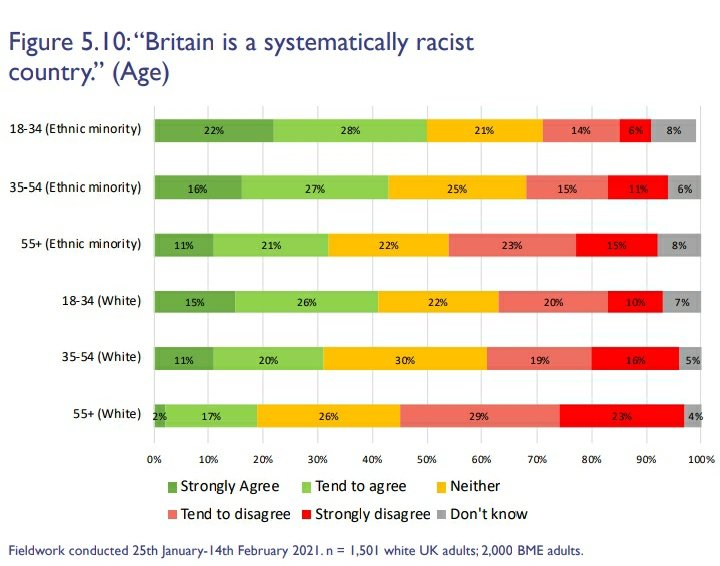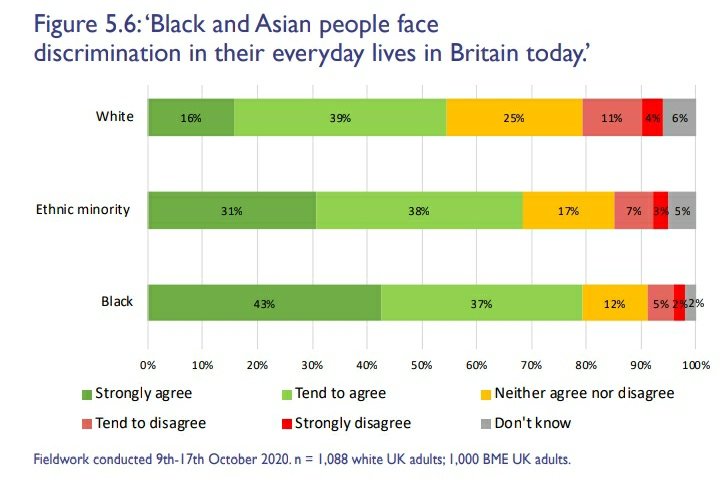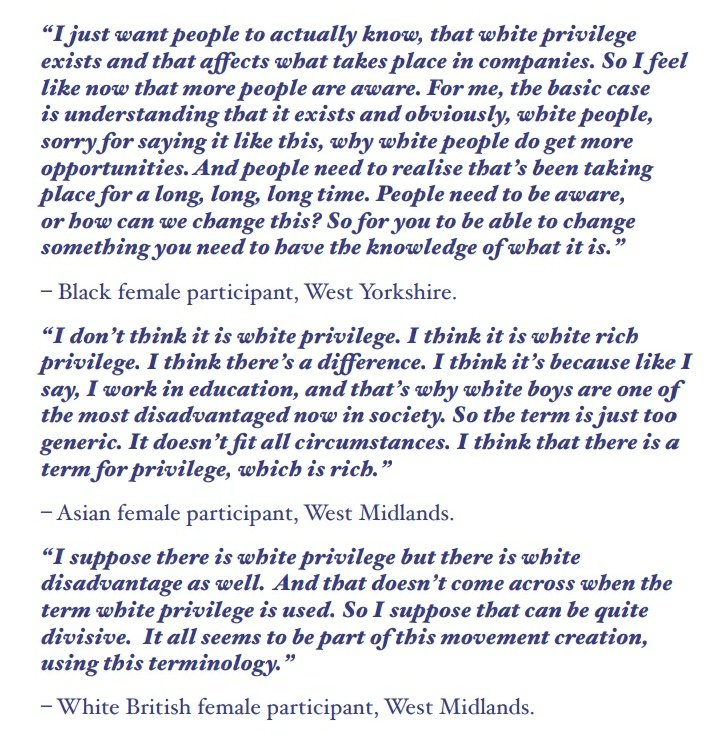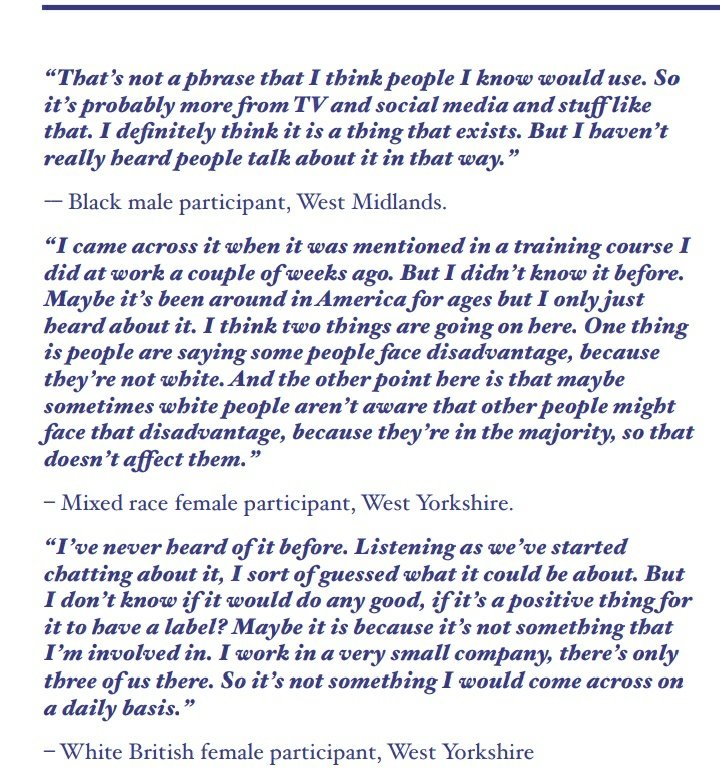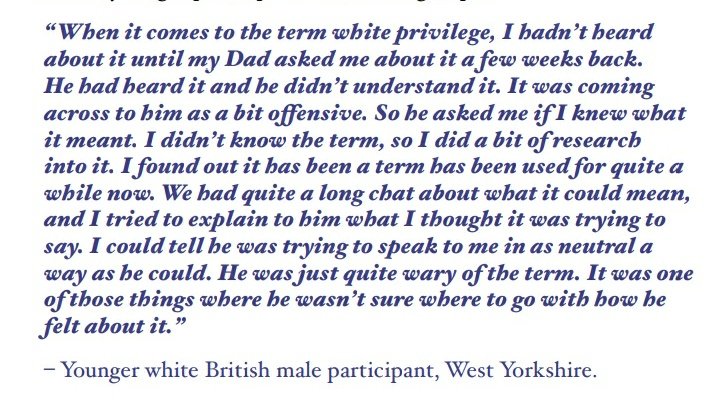Is Britain racist? This binary question is unhelpful and obstructs real progress | Sunder Katwala https://www.independent.co.uk/voices/race-report-bame-sewell-commission-b1825074.html">https://www.independent.co.uk/voices/ra...
What happens if you ask a very binary question of this kind?
@britishfuture asked people to respond to "Britain is systematically racist" as part of our study of public attitudes.
I found a couple of things surprising about the results and responses https://www.britishfuture.org/public-appetite-for-action-not-just-talk-on-race-new-research/">https://www.britishfuture.org/public-ap...
@britishfuture asked people to respond to "Britain is systematically racist" as part of our study of public attitudes.
I found a couple of things surprising about the results and responses https://www.britishfuture.org/public-appetite-for-action-not-just-talk-on-race-new-research/">https://www.britishfuture.org/public-ap...
"Britain is a systematically racist country" gets 30% agree and 38% disagree from public.
It does polarise by race, yet both the median white citizen (disagree 40% to 28%) and the median ethnic minority citizen (agree by 43% to 26%) is on the fence on this very binary question
It does polarise by race, yet both the median white citizen (disagree 40% to 28%) and the median ethnic minority citizen (agree by 43% to 26%) is on the fence on this very binary question
I found this the most striking finding. A plurality of white respondents under 35 agreed (43-30, +13) but a plurality of ethnic minority respondents over 55 disagreed (32-38, -6), with many on the fence. This is a generational split as much as an inter-group divide.
Try asking a different kind of question - do black and Asian people face discrimination in their everyday lives in Britain today - then 6/10 people agree and there is a broad inter-ethnic consensus to work with about how we could now change that.
57% of graduates say they are confident they know what "institutional racism" is about. 44% overall, as falls to 45% among ethnic minority non-graduates & 36% among white nongraduates. Another third have heard term but not sure of the meaning.A quarter of people have not heard it
https://twitter.com/sundersays/status/1377511005320806401?s=19">https://twitter.com/sundersay...
Thinking about race and class background, which matter most to opportunities and outcomes? "Both equally" is the most popular outcome for both ethnic minority Britons and for the white British. 1/4 say class, 15% (1/4 of minorities) say race. @NCPoliticsUK for @britishfuture
All the data https://twitter.com/NCPoliticsUK/status/1377175844351664131?s=19">https://twitter.com/NCPolitic...
Despite a v binary and polarised public debate, More in Common found a contrast between the UK and other countries (USA, France, Germany). More people in the UK try to consciously "balance" on race, even within more polarised progressive/conservative segments.
"Britain is a nation of balancers on race and immigration... the differences between segments are less stark than in many other national contexts". Oftrn find nuance, openness and the need to find a balance even among segments with the strongest views, report @MiC_Global
77% see racism as a serious problem. There is more intensity among the more left groups, but this is not a polarising idea
How using "white privilege" framing narrows support, mildly with minorities, and a lot with white people. Though many more agree if you say something v similar without using the word "privilege".
Chapter 5 of the new @britishfuture report looks at how people spoke about this and why this happens
"I don& #39;t think it is white privilege. I think it is white rich privilege. I think there& #39;s a difference ... I think there is a term for privilege, which is rich" was a very well received intervention in a West Midlands group from an Asian woman who works in education.
Only 1/5 white participants and 1/10 ethnic minority participants in our poll said they had not heard the phrase. In the discussions, many participants had begun to hear it during 2020, not before
One of my favourite contributions was from a young man in West Yorkshire, a recent graduate, sympathetic to the anti-racism protests. He had not heard this phrase until his Dad asked him what people were talking about. So he tried to look into it so he could talk to him about it
Eastern Eye column https://twitter.com/sundersays/status/1380179243540316161?s=19">https://twitter.com/sundersay...

 Read on Twitter
Read on Twitter
